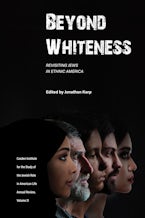The concept of ethnicity, once in vogue, has largely gone out of fashion among twenty-first-century social scientists, now replaced by models of assimilation defined in terms of the construction of whiteness and white supremacy. Beyond Whiteness: Revisiting Jews in Ethnic America explores the benefits of reconfiguring the ethnic concept as a tool to analyze the experiences of twentieth-century American Jews—not only in relation to other “white” groups of European descent, but also African Americans and Asian Americans, among others. The essays presented here, ranging from comparative studies of Jews and Asians as “model minorities” to the examination of postethnic “Jews of color,” demonstrate that expanding ethnicity beyond the traditional Eurocentric frame can yield fresh insights into the character of Jewish life in the modern United States.
FOREWORD
INTRODUCTION: TWO CHEERS FOR ETHNICITY
1. Yiddish Leftists as Early Inter-Ethniks, by Elissa Sampson
2. From the Classroom to the Soapbox: Multiethnic Workers Schools and Leftist Parties, by Robert M. Zecker
3. Parkchester: A Suburb in a City and the Challenge to Ethnicity, 1940–circa 1970, by Jeffrey S. Gurock
4. Overrepresented Minorities: Comparing the Jewish and Asian American Experiences, by Jonathan Karp
5. “A bunch of blond meshugeners”: Mormons in the American Jewish Imagination, by Julian Levinson
6. Jewish American Writers and the J-Word, by Hana Wirth-Nesher
7. “I Didn’t Know There Were Epsteins in Puerto Rico”: Jewish Ethnicity in American Comedy, by Jarrod Tanny
8. Like Other (Mixed Parentage) Jews, Only More So: A Mixed Methods Analysis of Jews of Color, by Bruce A. Phillips
ABOUT THE CONTRIBUTORS
ABOUT THE USC CASDEN INSTITUTE

